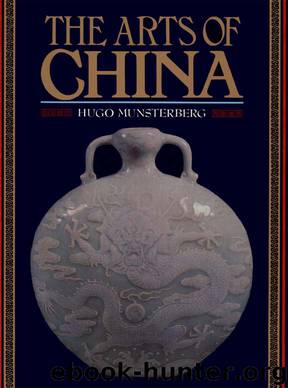The Arts of China by Hugo Munsterberg

Author:Hugo Munsterberg
Language: eng
Format: epub
ISBN: 0-8048-1624-7
Publisher: Tuttle Publishing
CHAPTER SEVEN
The Art of the SUNG DYNASTY
(960-1280)
THE ABDICATION of the last T'ang Emperor in 906 was followed by a period of chaos and war. The country was divided into a number of small kingdoms, many of which were ruled by barbarians. Chinese historians call this the Five Dynasties period after the five short-lived ruling houses which briefly controlled the northern part of the country. After five decades of disunity and strife, the Chinese were ready for a leader who could bring peace and unity to the country. The man who succeeded was a general named Chao Kuang-yin, who became the first emperor of the Sung dynasty, which ruled China from 960 to 1280.
Later Chinese historians have tended to belittle the Sung rulers because they did not continue the imperialist conquests of the Han and T'ang emperors but pursued a pacifist policy, trying to buy off the northern nomads. Nevertheless, this was a period of great cultural achievement. Chinese civilization attained a refinement and sophistication which was never again equaled, and the emperors, as C. P. Fitzgerald says, were the most enlightened sovereigns who ever ruled China: "tolerant, humane, artistic and intellectual, free from the vices which have so often disgraced Oriental monarchs." More dedicated to the arts of peace than to the pursuits of war, they were no match for the barbarian tribes which menaced the northern frontiers. First the Kitan, a people of Tartar stock, established the Liao kingdom in Manchuria, Jehol, and Inner Mongolia and were only prevented from further conquests by being paid a large annual tribute. In 1124 the related Kin tribe overthrew the Liao and conquered most of northern China. The Sung Emperor Hui Tsung was defeated, and the rulers were forced to flee to the south. The second part of the Sung era, during which the capital was at Hangchow, is known as the Southern Sung period. This division of China into two states lasted until 1280, when the country was united by the Mongol conquerors.
Sung China, with a population of one hundred million people, was no doubt the most civilized country in the world. The pride which the Chinese felt is best expressed in a saying attributed to Shao Yung: "I am happy because I am ... a Chinese, and not a barbarian; and because I live in Loyang, the most wonderful city in all the world." Despite the military weakness of the Sung rulers, or perhaps because the energies of the nation were not channeled into war, it was a period of great intellectual and artistic ferment. In philosophy the most important development was the neo-Confucianist school of Chu Hsi, whose thinking has dominated all later orthodox teaching. Poetry rivaled that of the T'ang period, and painting and ceramics reached a golden age which has never been surpassed. Ch'an Buddhism flourished and had a profound influence upon intellectual life. Buddhism in general, however, continued to decline, and the traditional schools degenerated more and more into popular faiths for the common people.
The finest embodiment of the Sung genius was its painting.
Download
This site does not store any files on its server. We only index and link to content provided by other sites. Please contact the content providers to delete copyright contents if any and email us, we'll remove relevant links or contents immediately.
Ancient Worlds by Michael Scott(2687)
Savage Harvest by Carl Hoffman(1960)
The Monuments Men by Robert M. Edsel(1779)
Cain by Jose Saramago(1546)
The Apogee - Byzantium 02 by John Julius Norwich(1454)
A History of the World in 100 Objects by MacGregor Neil(1370)
The O. Henry Prize Stories 2014 by Laura Furman(1245)
The Unfinished Palazzo by Judith Mackrell(1213)
The Swerve by Greenblatt Stephen(1153)
The Lost Secrets of Maya Technology by James A. O'Kon(1124)
Joan Miró by Joan Miró(1093)
50 Art Ideas You Really Need to Know by Susie Hodge(1081)
Cain by Saramago José(1060)
4 3 2 1 by Paul Auster(1055)
A Piece of the World by Christina Baker Kline(1027)
Heretics and Heroes by Thomas Cahill(1020)
The Book of Ruby(1014)
Raising Hell: A Concise History of the Black Arts and Those Who Dared to Practice Them by Robert Masello(978)
1484244826 by Unknown(966)
